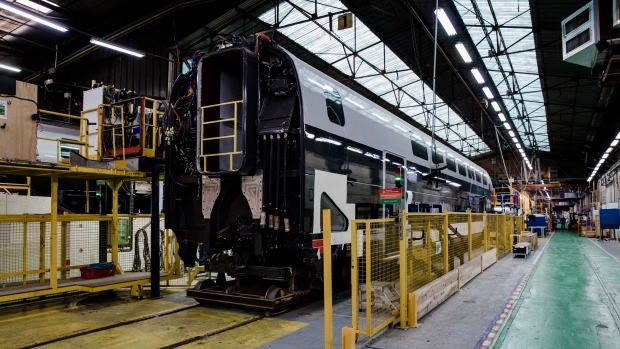Feb 6, 2019
Siemens-Alstom deal derailed by EU on competition concerns
, Bloomberg News

Siemens AG and Alstom SA suffered the final blow to their rail merger plans after European Union antitrust regulators refused to cave in to warnings about the looming threat of Chinese competition.
EU Competition Commissioner Margrethe Vestager formally vetoed the tie-up, saying the companies "were not willing to address our serious competition concerns" about the combined firm’s control over rail signaling systems and very high-speed trains.
The decision is a victory for Vestager who came under intense pressure from French and German ministers demanding the creation of a European “champion” able to meet head-on competition from China. The tie-up -- unveiled in September 2017 -- would have merged Siemens’s mobility unit and Alstom to create an entity with about 15 billion euros (US$17 billion) in revenue.
The deal "would have created the undisputed market leader" for some signaling and a dominant player in very high-speed trains, the EU said. Chinese suppliers for signaling "are not present" in Europe and it "will take a very long time before they can become credible suppliers.” Chinese rivals for very high-speed trains are "highly unlikely" to rival the companies in the region in the foreseeable future.
The companies failed to fully address the EU’s concerns because their offer to sell signaling businesses was "a complex mix" that wasn’t a "standalone and future-proof business" allowing a buyer to compete against the merged firm.
Alstom shares rose as much as 3.5 per cent in Paris, while Siemens dropped as much as 1 per cent in Frankfurt.
The offer to sell Alstom’s Pendolino was deemed to fall short because it was "a train currently not capable of running at very high speeds." A pledge to license Siemens’ Velaro train technology was restrictive and wouldn’t have allowed a rival develop a competing very high-speed train, the EU said.
Siemens CEO Joe Kaeser said in a statement that while not unexpected, the decision “proves that Europe urgently needs structural reform.”
“The upcoming European elections and subsequent new leadership will provide a unique opportunity to shape a Europe of the future,” Kaeser said in the statement.
Signs of trouble emerged in October when the EU issued a statement of objections that was harsher than expected. Siemens and Alstom offered up a concession package in December, and attempted to sweeten that package in subsequent conversations with the commission, but were unable to sway the regulator.
The companies had offered up all of Siemens’ on-board signaling technology, as well as all of Alstom’s Wayside and Interlocking signaling technology. The combined signaling concessions were large enough that both companies felt the deal would result in no synergies from that side of the business, people familiar with the matter said in January.
The EU also cited worries around the very high-speed rail, or trains that can travel faster than 300 km per hour.
While it’s rare for the EU to veto a deal, regulators on Wednesday also blocked another German deal -- Wieland-Werke AG’s plan to buy part of Aurubis AG -- over concerns the combination might eliminate competition for copper rolled products. Vestager has now blocked five deals since she became commissioner in 2014. EU opposition has forced several other companies to abandon transactions, often after they decided concessions to gain approval would be too painful.





